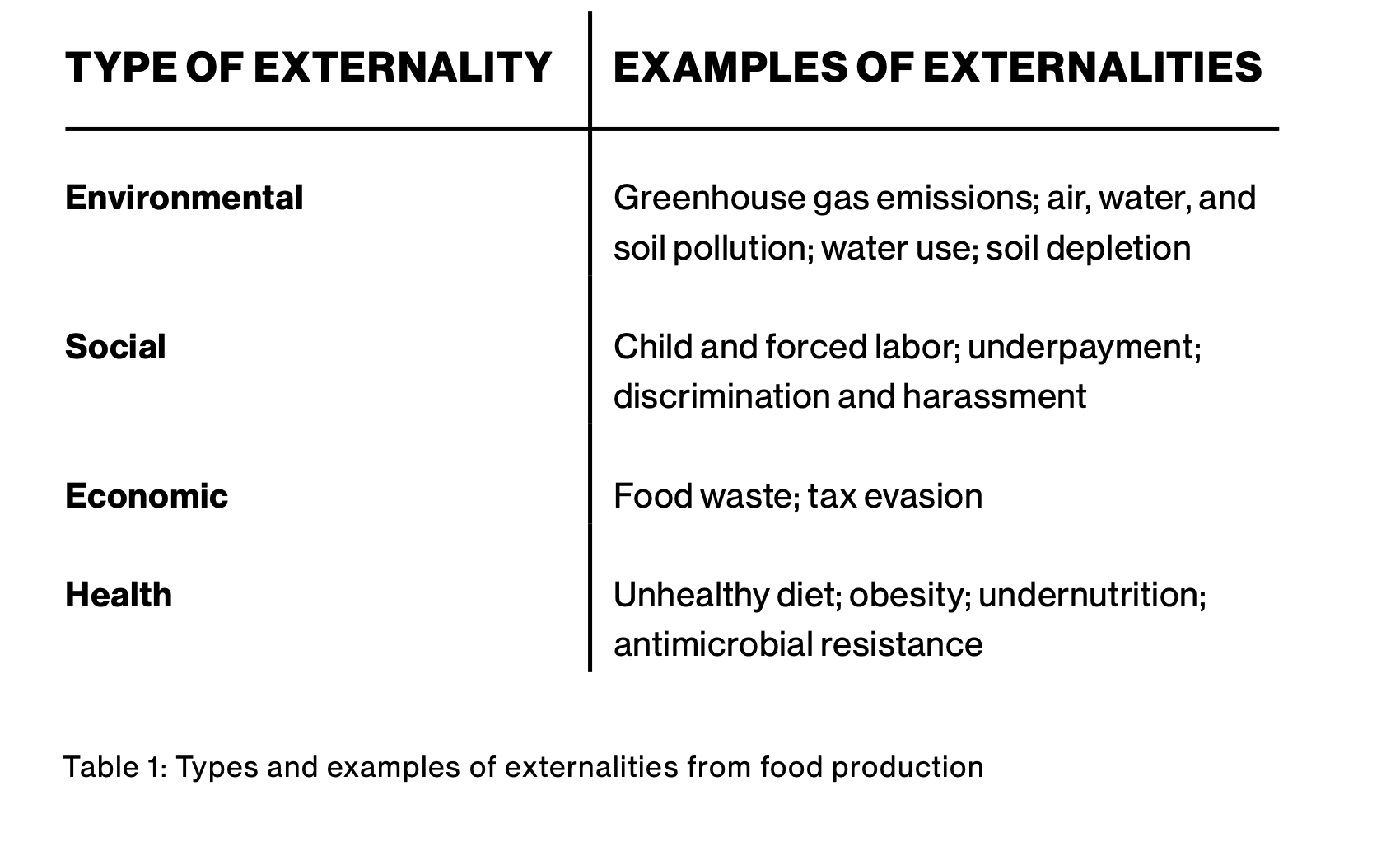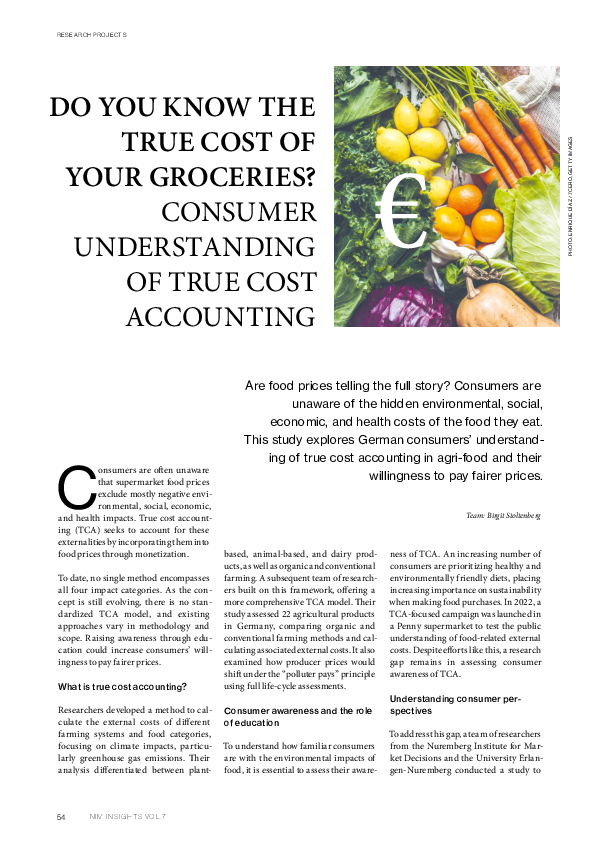Forschung
Do You Know The True Cost of Your Groceries?

PHOTO: ENRIQUE DÍAZ / 7CERO, GETTY IMAGES
Are food prices telling the full story? Consumers are unaware of the hidden environmental, social, economic, and health costs of the food they eat. This study explores German consumers’ understanding of true cost accounting in agri-food and their willingness to pay fairer prices.
Consumers are often unaware that supermarket food prices exclude mostly negative environmental, social, economic, and health impacts. True cost accounting (TCA) seeks to account for these externalities by incorporating them into food prices through monetization.
To date, no single method encompasses all four impact categories. As the con- cept is still evolving, there is no stan- dardized TCA model, and existing approaches vary in methodology and scope. Raising awareness through edu- cation could increase consumers’ willingness to pay fairer prices.a
What is true cost accounting?
Researchers developed a method to calculate the external costs of different farming systems and food categories, focusing on climate impacts, particularly greenhouse gas emissions. Their analysis differentiated between plantbased, animal-based, and dairy products, as well as organic and conventional farming. A subsequent team of research- ers built on this framework, offering a more comprehensive TCA model. Their study assessed 22 agricultural products in Germany, comparing organic and conventional farming methods and calculating associated external costs. It also examined how producer prices would shift under the “polluter pays” principle using full life-cycle assessments.
Consumer awareness and the role of education
To understand how familiar consumers are with the environmental impacts of food, it is essential to assess their awareness of TCA. An increasing number of consumers are prioritizing healthy and environmentally friendly diets, placing increasing importance on sustainability when making food purchases. In 2022, a TCA-focused campaign was launched in a Penny supermarket to test the public understanding of food-related external costs. Despite efforts like this, a research gap remains in assessing consumer awareness of TCA.
Understanding consumer perspectives
To address this gap, a team of researchers from the Nuremberg Institute for Market Decisions and the University Erlangen-Nuremberg conducted a study to understand consumers’ knowledge of and understanding of true cost accounting in the agri-food sector.

How well do German consumers understand TCA?
A qualitative research approach was used, involving five individual interviews and two focus groups with seven participants each. Participants were selected based on specific criteria and divided into two demographic groups. The first group consisted of university students living independently, and the second group included employed individuals living with a partner, preferably with children. This division aimed to examine differences between younger and more mature consumers.
The results showed that some participants were already familiar with the English term “true cost accounting” and the German equivalent “wahre Preise”. The German term was preferred, as it was perceived as more relatable and easier to grasp, especially for older individuals.
Attitudes towards fair pricing and responsibility
Most participants rated current food prices in Germany as too high; however, some participants recognized that prices for certain products are unrea- sonably low. Respondents also struggled to accurately assess the external costs associated with organic versus conven- tional products. This was particularly evident in a question in which participants were asked which type had higher true costs.
The findings also indicated that German consumers have only limited knowledge about TCA. Interviewees tended to associate TCA with general pricing mechanisms, while focus group discussions revealed a more accurate understanding. In each focus group, at least one participant was familiar with the topic, helping guide the discussion constructively.
Overall, both groups, student participants and employed participants, expressed generally positive views toward TCA and, under specific conditions, showed a willingness to accept higher prices. The study revealed a growing support for TCA and an open- ness among consumers to internalize these costs in the future.
Conclusion
Contrary to initial expectations, the study found that some German consumers are already familiar with the concept of TCA. However, many consumers still do not realize how much current food prices significantly underestimate the real environmental, social, economic, and health costs. After a brief introduction to the TCA concept, participants were able to iden- tify the costs TCA seeks to internalize. Moreover, most participants considered TCA a valuable approach and expressed a conditional willingness to bear these additional costs. In conclusion, German consumers possess limited yet growing awareness of TCA in the agri-food sector. Therefore, efforts to inform the public—through campaigns, clearer terminology, and targeted education—are vital steps toward a more sustainable food system in which prices reflect true costs.
KEY INSIGHTS
- Academia: There is a research gap in understanding the consumer perceptions of TCA. This study provides a basis for further interdisciplinary research on how socio-demographics, terminology, and education shape awareness and behavior
- Business (e.g., retailers, food manufacturers): Consumers value sustainability and fairness in pricing but lack a full understanding of the external costs associated with food production. Businesses can lead through transparency and innovative sustainability-driven pricing
- Consumers: Although their knowledge is limited, consumers are open to learning and are willing to support fairer pricing when the benefits—environmental, social, and health—are made clear.
- Public policy: A strong case exists for integrating TCA principles into national food and sustainability policies. Standardized frameworks, consumer education, and support for cost internalization (e.g., taxes, labels) could influence markets and public perception.
Projektteam
- Birgit Stoltenberg, Senior Researcher, NIM, birgit.stoltenberg@nim.org
Kooperationspartner
- Johanna Katharina Vill, Technische Universität Dresden
- Francisco Layrisse Villamizar, Friedrich-Alexander University of Erlangen-Nürnberg
Kontakt

